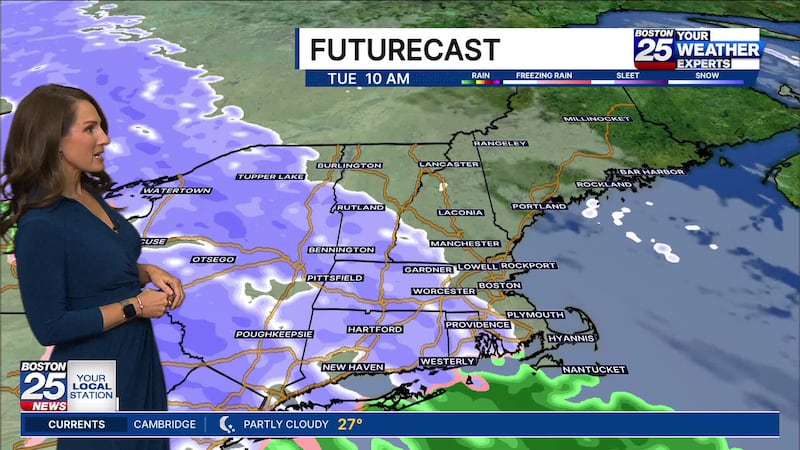BOSTON — These are quiet times at area animal shelters.
“In New England, we do see a population change in the winter versus the summer,” said Colleen Doucette, director of operations at the Cape Cod MSPCA shelter. “But this is a very low population for us certainly.”
The population at the Centerville shelter consisted, this week, of exactly two dogs.
One of them is a seven-month-old mixed-breed named Diamond.
“She is very, very funny and playful,” Doucette said. “She definitely wants somebody who’s going to be with her all the time.”
And these days, shelter dogs are pretty much in the driver’s seat when it comes to choosing a home. Diamond, to use the parlance of real estate, had been the subject of ‘multiple offers.’
“We have received quite a few applications for her,” Doucette said. “And we’re just kind of sorting through to see who would be a great fit for her.”
“The interest in adoption is really outstanding now,” said Michael Keiley, director of adoption centers and programs for the MSPCA/Angell. “During this pandemic we’ve seen an incredible increase in interest in adoption.”
In fact, MSPCA saw pet adoptions spike 20 percent in the first few weeks of the pandemic, Keiley said.
And while highly adoptable animals have always moved through shelters fairly quickly, even difficult cases are more rapidly finding homes.
“Animals that might be a little on the shy side or older or have some medical needs or behavior needs tend to stick around a little bit longer,” Keiley said. “But we’ve seen even with those animals, they’ve been able to find matches much more quickly.”
Shelters mainly attribute this increased interest in adoption to a need for the kind of comfort a pet provides, and the fact many are either working from home or not working at all -- and thus have time to care for a pet.
Since shelters are in the business of finding good homes for cats and dogs, this is all good -- except for one thing:
“At the point at which people are really excited to adopt we’re also seeing some of the lowest amounts of animals in our shelter,” Keiley said.
The same is true for the Animal Rescue League of Boston.
“We can’t even begin to supply the demand,” said Boston ARL Shelter Manager Carolyn Curran. “We are flooded with inquiries really regularly.”
Like MSPCA, Animal Rescue League is used to a light shelter crowd in winter -- to a point.
“That’s pretty normal,” Curran said. “The decline that we’re seeing is more extreme than usual, I would say.”
Curran offered one possible reason why fewer animals are coming in:
“Sometimes we have animals that are surrendered for no time and it seems people have all the time in the world right now,” she said.
But at the MSPCA, they’ve concluded it’s something else.
“I think it’s become very clear that the reason that the number of animals entering our shelters is down by 32 percent is related to the housing moratorium,” Keiley said.
About 20 - 25 percent of the animals ending up in MSPCA shelters each year come from families who have moved -- some of them forced out by evictions and foreclosures.
The housing moratorium was put into place for public health and economic reasons during the pandemic. It prevents eviction for nonpayment of rent.
“Now the concern, obviously, is that that housing moratorium will be lifted at some point,” Keily said.
In fact, the state housing moratorium expired in October. A federal moratorium, run through the Centers for Disease Control and Prevention, is set to end on March 31.
“There’s a chance that a larger number of animals will start to come into our centers once people start unfortunately going through the eviction or foreclosure process,” Keiley said. “So it’s incumbent upon us to be prepared for that but also help support people. We don’t want animals to become homeless because of this pandemic.”
To that end, Keiley said MSPCA is putting programs in place to help support families financially and in other ways with the goal of helping them keep their animals. Because, he said, those forced to move usually don’t want to give up their pets.
“We’ve learned from experience that whenever there’s a tragic situation where people really have to make that tough decision because of a lifestyle change, it’s really traumatic to them,” Keiley said. “In that they cared deeply about that animal and are just trying to do the best to put them in the best position possible.”
Download the free Boston 25 News app for up-to-the-minute push alerts
>> Complete local and national coronavirus coverage here
RESOURCES:
- Complete local and national coronavirus coverage here
- Follow us on Facebook and Twitter | Watch Boston 25 NOW





